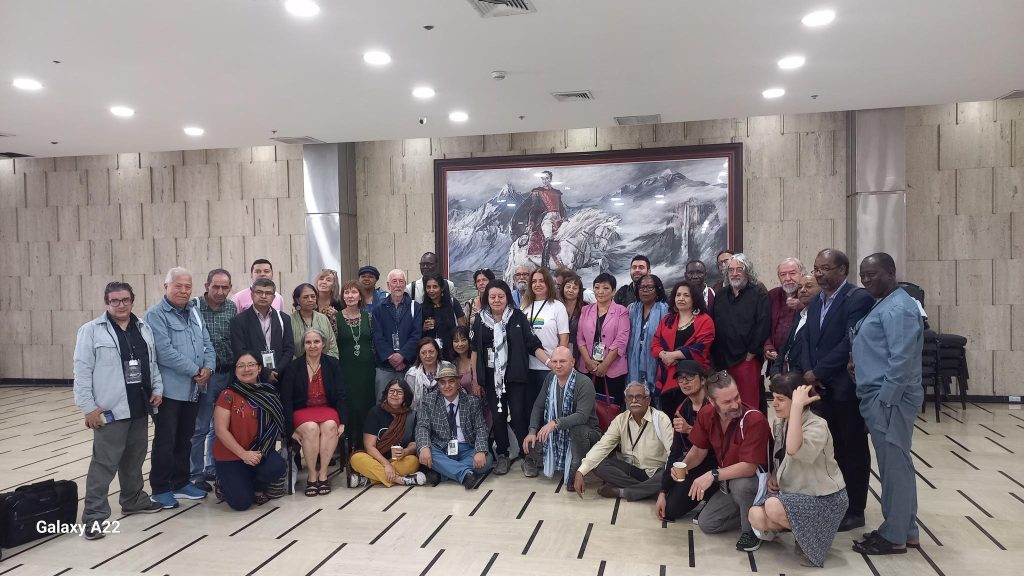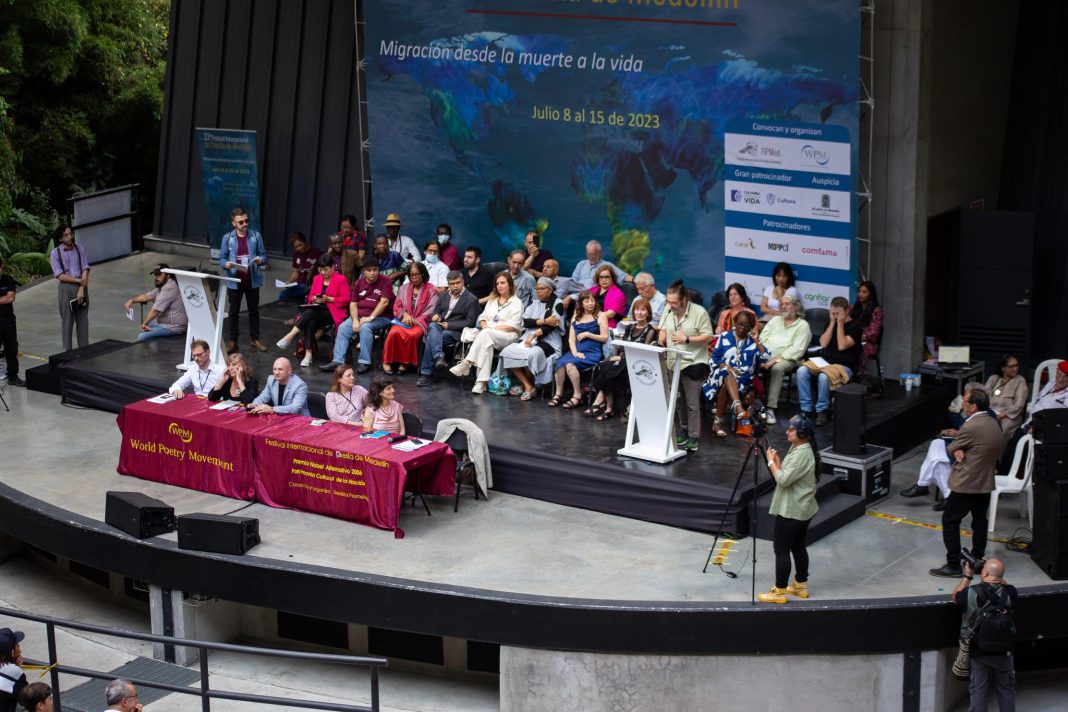By Paul Liam
Founded against the background of the apocalyptic threats bedeviling the world by thirty-seven directors of international poetry festivals from four continents on 7 July 2011, in the context of the 21st International Poetry Festival of Medellin, in Colombia, the World Poetry Movement (WPM) “promotes poetry as an essential form of expression and communication of humanity.” It strives for the unification of the world through the appropriation of the subliminal powers of poetry as a tool for social and cultural transformation. The WPM professes the noble mission of promoting poetry, cultural diversity, and dialogue between cultures worldwide. It also aims to foster the creativity and artistic expression of poets from all over the world and to connect them with a global audience through various poetry-related activities and events. It was for the concretization of these ingenious ideals that the movement recently held its first global congress which took place yet again in its founding city of Medellin, Colombia, and Caracas, Venezuela respectively. The epochal event witnessed the participation of renowned and emerging poets from around the world with representation from all the continents.
The world congress of poets was convened as part of the 33rd annual Medellin International Poetry Festival which was held from July 1st to 15th 2023. The festival incorporated virtual and physical programming as some of the delegates could not make it to Medellin due to logistical challenges. The festival commenced with the virtual participants featuring poetry presentation and reading by Valerio Magrelli (Italy), Nuno Judice (Portugal), Etenat Awol (Ethiopia), Paul Liam (Nigeria), Horacio Benavides (Colombia), Liu Xunfu (China), Lux Mary Giraldo (Colombia), Rom Freschi (Argentina), Lux Helena Cordero (Colombia), Edwin Madrid (Ecuador), Maria Casiraghi (Argentina) and Mario Melendez (Chile) respectively. While the virtual event presentation was held from 1-7th July, and the physical event was held from 8-15th July thereby enabling a cohesive programming that carried everyone along. The physical event was further split between Medellin and Caracas and it also featured virtual participants who joined via Zoom. The congress was also featured as part of the 17th World Poetry Festival of Venezuela which took place in Aragua and featured about one hundred poets from around the world. These events were seamlessly organized and managed as attested to by the participants. Fifteen African poets represented the continent of Africa at the congress.

It was however on the 13 and 14 of July that the delegates congregated in Medellin for deliberations and presentation of continental reports which were led by the continental coordinators. The congress, therefore, began with welcome and opening remarks from the General Coordinator of the WPM, Fernando Rendón (Colombia) who expressed his elation at the convergence of the world poets and enthused that it was the contributions of every one of them that has led to the successes that the movement has achieved around the world. He went on to reiterate the commitment of the movement to serve as a viable platform for the promotion of poetry and for poets of the world to interact, exchange ideas and forge a common bond of brotherhood. He posited thus:
Poetry recovers for the world human dignity, multiplicity, and plurality. The spirit of nature will return, as poets we are not the saviours of the world, but we will do our task. To recover the lost language, the fire of the collective soul. To bring about a worldwide poetic revolution, through poetry festivals, translations and book editions, poetry schools, and communication processes.
He further stated that the movement is now present in 130 countries of the world and that more than 60 poetic actions had taken place globally in honour of the congress. Rendon’s powerful speech was received with thunderous applause by the delegates. Freddy Alfred Nazareth Ñáñez Contreras, the Minister for Communication and Information of the Republic of Venezuela and poet, commended the WPM for its humanistic strides and agenda of conscientizing the world through poetry. He also spoke about poetry and its various importance to the development of society. He stressed, in particular, the significance of establishing a poetry school for the teaching and learning of poetry to young people, he drew inspiration from the Venezuelan School of Poetry which he said has impacted about 2,500 secondary school children in the country. He enjoined the delegates to push for the establishment of poetry schools in their respective countries through collaboration with their governments. He also buttressed the imperative of global peace and unity and the role of poetry in driving social change by highlighting the pivotal role of poets as agents of positive change. He remarked that:
What is demanded of poets and artists today is their commitment to life, the possibility of being useful and rendering a strong and important service to our peoples and humanity. To advance in a common plan, with the specificities of the WPM and guidelines that enhance this cohesion and give it strength for the future, from the concrete of the impact of poetry in the communities. The School of Poetry in Venezuela has impacted 2500 young people from secondary schools involved with literary creation and reading.
Continental coordinators afterwards took turns giving accounts of their continent’s performances. Dr Ayo Ayoola-Amale who also doubles as the National Coordinator for Ghana spoke of the various contributions of national coordinators in Africa towards the advancement of the movement. In her presentation, she declared that “A woman in Africa is the mother of humanity” implying that Africa is the source of humanity. She acknowledged the hard work of the various national coordinators of the African continent who continued to initiate and execute various projects geared towards promoting and enhancing the presence of the movement on the continent despite encountering challenges. She went on to read the individual reports of each country. Other continental coordinators who made presentations at the congress included: Rati Saxena, WPM Asia, Francis Combes, WPM Europe, Oscar Saavedra, WPM America, Vaughan Rapatahana, WPM Oceania. They all spoke brilliantly about the work being done by member countries to strengthen the movement in their continents. They also highlighted some challenges such as language barriers, lack of funding for literature, conflicts, and human rights abuses among others. They however made commitments to continue to work towards the realization of the objectives of the movement in their respective continents.
One of the highlights of the opening session of the congress was the tribute to JACK HIRSCHMAN (December 13, 1933 – August 22, 2021) who was an American poet and social activist who wrote more than 100 volumes of poetry and essays and was one of the founders of the WPM. Led by Fernando Rendon who gave a brief biography of Hirschman, other poets also read tribute poems in his honour and Ashraf Aboul-Yazidfrom Egypt presented a portrait of Hirschman to his wife, Agneta Falk and to WPM respectively. It was an emotional moment as designated delegates took turns to salute the courage and selfless contributions of Hirschman to the development of poetry, literature, and social justice.
The tribute to Hirschman heralded a brief recess which then ushered in the afternoon session which focused on interventions by the rest of the delegates who poured out their heartfelt congratulations to the organisers and General Coordinator, Fernando Redon for his altruistic commitment to the promotion of poetry and for putting together a successful congress of global poets. They also proffered various interventions geared towards strengthening the movement and the message of poetry to underserved communities. They repeatedly highlighted the evocative powers of poetry to cause change and engineer a transcendental spirit of brotherhood amongst the humans of the world. Although the delegates spoke in different languages the messages were the same; the need to promote poetry and enhance its capacity to function as a tool for the rebirth of human consciousness and collaboration and to foster social, environmental, and cultural justice around the world.
After due deliberations, the congress adopted an already developed strategic plan which had previously been distributed to delegates for review and imputes before the congress. The World Poetry Movement Strategic Plan 2023-2028 highlights six core areas of intervention for the next five years which include the following:
Poetic Actions: Establish as a practice that poetry goes to meet the common human being, carrying out poetry readings in public and closed places, in subways, buses, neighborhoods, parks, and market squares. Pedagogical Projects: Implementation of the World Poetry School, critical, dialogical, based on humanist values, committed to peace and the life of the planet. Publishing Project: Creation of a printed publishing collection of WPM with periodical publications of books. Publication of magazines, to disseminate the poetic work of the members of the network of members of the World Poetry Movement and other national and international poets. Organizational and management processes: Hold an annual (virtual) congress of the World Poetry Movement on each continent, to deepen the commitment of country coordination and national movements. Communications: Strengthening of the World Poetry Movement website (www, worldpoetrymovement.org). Creation of a collective voice of the Movement, through actions such as periodic publications of verses or poems on social networks; having an internet radio and an IP TV channel. Defense of Human Rights and all forms of Life: Highlight the importance and defense of our indigenous cultures and languages and the role of poetry in social cohesion, in the resolution of social conflicts, for total decolonization, and against moral decadence.
WPM is also calling on the countries of the world to “recognize the fundamental human rights and freedom of expression of poets and writers, to desist from violating freedom of expression and to take all measures to safeguard it, while maintaining transparency in governmental actions.” It is also pushing for the promotion of “poetic creation of all communities, valuing diversity, with an anti-patriarchal and decolonizing vision, especially among indigenous peoples, Afro-descendants, migrants, and LGBTIQA+ groups, and establish a fund to help migrant poets who are on all borders.”
While the WPM Strategic Plan 2023-2025 is rich with lofty ideals and objectives with significant positive implications for the promotion of poetry, peace, human rights, social justice, and cultural advancement in the world, its successful implementation and actualization would require altruistic leadership and the resilient commitment of all stakeholders.
Paul Liam is a poet and communication specialist based in Abuja, Nigeria. He is the Nigeria National Coordinator of the World Poetry Movement (WPM).



